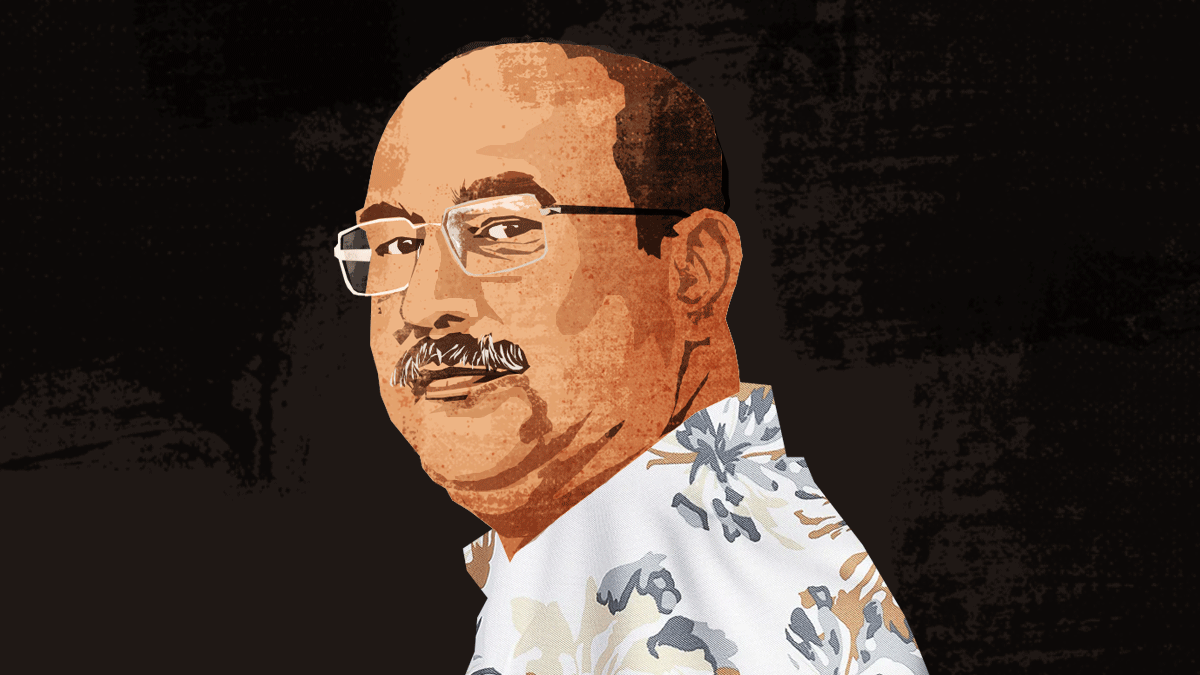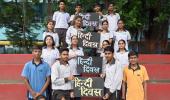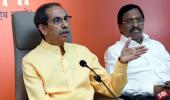'Languages should be introduced when the brain is ready, not when it's most vulnerable.'

Acclaimed Marathi poet Hemant Divate has returned the Maharashtra government's Keshavsut Award and the Rs 1 lakh prize he received in 2021 to protest against the state's recent mandate introducing compulsory Hindi from Class 1 to 5 alongside Marathi and English.
Divate sees this policy as a form of linguistic coercion that undermines Constitutional federalism and endangers the cognitive and cultural development of children.
In this two-part conversation with Prasanna D Zore/Rediff, Divate explains why the imposition of a third language at such a tender age is both pedagogically unsound and politically troubling.
Interestingly, Maharashtra Chief Minister Devendra Fadnavis, just a day before, stated that the policy is under review and a final call will be taken only after consulting all the stakeholders.
You accepted the Keshavsut Award from the Maharashtra government in 2021 after publishing your poetry collection Paranoia. But now, you've decided to return it in protest. What changed?
I am against the imposition of Hindi -- especially at such an early stage. For a child in Class 1, it's far too fragile an age to be taught three languages.
First, they must learn their mother tongue. Then, maybe another like English, which is now accepted globally. But introducing a third compulsory language at this stage is not only unnecessary -- it's harmful.
There are 22 recognised languages in India. Why only Hindi? If the goal is inclusion, then give children access to all languages and let them choose.
Education should empower, not enforce.
But in practical terms, how can schools offer so many language options?
That's where technology comes in. With AI, online modules, and state collaboration, we can develop digital curriculum in all 22 languages -- from basic to fluency. Let's not underestimate what's possible today.
If the central and state education departments work together, they can create flexible, scalable content. This isn't a logistical impossibility -- it's a matter of political will.
So your opposition isn't to teaching Hindi as a language in schools -- but what you call 'imposition of Hindi'?
I have no issue with Hindi. If tomorrow any other language were imposed the same way, I'd protest that too.
Let the child and their parents choose. A Bengali child in Mumbai might prefer Bengali. But when you enforce Hindi on everyone, it's a clear violation of personal and linguistic freedom.
What made you return not just the award but also the Rs 1 lakh prize?
The government issued a GR (government resolution) making Hindi compulsory from the next academic year. That's what triggered it.
Such a significant decision should have been taken after consulting linguists, child psychologists, and educators. They should have asked: Is this viable? Will it lead to dropouts? Will it affect learning outcomes?
Instead, they took a top-down decision. This will confuse children.
Language isn't something you can just plug in. It has emotional, cognitive, cultural dimensions.
You believe children will be unable to cope?
Absolutely. At that age, brains are still developing. Learning a new language -- especially one with a script similar to Marathi -- will create cognitive confusion.
Children may end up speaking neither proper Marathi nor proper Hindi. That's a recipe for cultural erasure. We're not helping them -- we're hurting them.
But many students voluntarily take up languages like German, French or Spanish as they grow up. Isn't that the same?
No. When we learn German, French or Spanish after Class 12 or while in Class 9, it's by choice. We're cognitively mature. We know why we're learning it -- maybe for a job or study. That's not the case with a six year old.
Languages should be introduced when the brain is ready, not when it's most vulnerable. You can't make children your laboratory for political experiments.
What message are you sending to the state government?
Stop this policy immediately. Then start a conversation -- with experts, not just bureaucrats. Ask linguists, teachers, psychologists: What is best for the child?
I'm not an expert, but as a writer, as someone who has worked with language all my life, I know this will damage both the child and the language ecosystem.
We must be custodians of language. This policy threatens not just Marathi -- but linguistic diversity as a whole.










